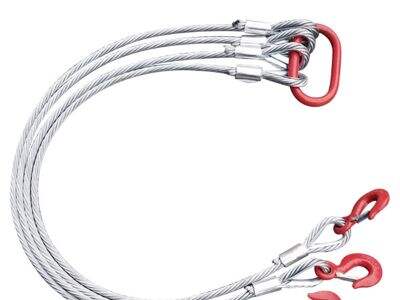Wire ropeis a popular strong type of rope that is combined with many metal wires. This also comes in very helpful when lifting heavy things or grasping something firmly. All wire ropes are not the same however. When selecting the correct wire rope to use for your job, it is important to check out our special characteristics.
How Strong is Wire Rope?
The strength of wire rope is very important, as it needs to bear heavy loads without snapping. LoadStar Wire rope consists of layers called strands, with each strand made up of many wires twisted together. The more wires and strands a wire rope has the stronger it will be. This means that when selecting a wire rope sling, it would be wise to select a wire rope which has a greater number of wires and strands for a stronger rope.
Why is Corrosion Resistance so Key?
Corrosion refers to the process by which metal rusts and becomes weak with time. So breaking wire ropes that are not corrosion resistant can cause accidents. Therefore, finding a wire rope cable with a decent resistance to corrosion is one of the things that are essential. This protects the wire rope against rust even if it works in wet or humid spots. By having good corrosion-resistant wire rope, it will last longer and remain strong.
How Does It Compare to Flexibility and Fatigue Resistance?
Flexibility indicates how easily a wire rope can bend and move around objects. Flexible wire rope is necessary when you need to lift, or pull things in various directions. Fatigue resistance refers to a wire rope’s ability to withstand repeated flexing and stretching without breaking. Flexible and fatigue resistant wire ropes have a longer life and a higher safety factor. Choose a wire rope that has flexibility for good performance and fatigue resistance.
Taking Care of Wire Rope
Just like we keep our toys and clothing well cared for, wire rope also requires care to be strong and long lasting. Lubrication: The process of applying oil or grease to a wire rope in order to facilitate movement and reduce wear. Performing regular maintenance of the machinery, such as checking for broken or damaged wires, rust and oil leakage, will help prevent any accidents. This can help ensure that the wire rope itself can continue to keep in good shape as well.
Correct Thickness and Core Type Selection
Wire rope’s diameter simply refers to how thick it is. Thicker wire rope has a higher strength and a tensile capacity. When selecting wire rope, you want to ensure that you select the appropriate thickness for your project. The center part of the wire rope that holds all the strands together is called the core. Cores can be of different kinds such as fiber core or steel core. Since each type has its own strengths and weaknesses, choose the right core type for your needs.
To summarize, key considerations when searching for wire rope are strength, corrosion resistance, flexibility, fatigue resistance, lubrication, maintenance, thickness and core type. Focusing on the above factors will help you select the right wire rope based on your requirements, thus ensuring safety during lifting and holding. So, for any heavy-duty task, remember to use LoadStar wire rope.

 EN
EN
 AR
AR
 BG
BG
 HR
HR
 CS
CS
 DA
DA
 NL
NL
 FI
FI
 FR
FR
 DE
DE
 EL
EL
 HI
HI
 IT
IT
 JA
JA
 KO
KO
 NO
NO
 PL
PL
 PT
PT
 RO
RO
 RU
RU
 ES
ES
 SV
SV
 TL
TL
 IW
IW
 ID
ID
 LT
LT
 SR
SR
 SL
SL
 SQ
SQ
 HU
HU
 TH
TH
 TR
TR
 FA
FA
 AF
AF
 MS
MS
 HY
HY
 AZ
AZ
 BN
BN
 SO
SO
 KK
KK

